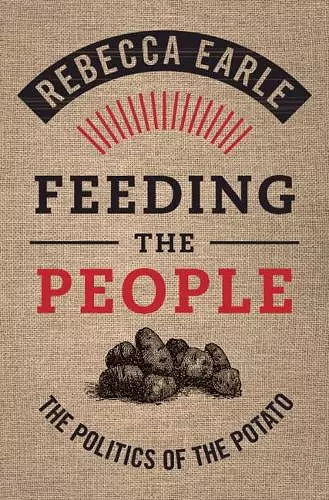Feeding the People
The Politics of the Potato
Format:Hardback
Publisher:Cambridge University Press
Published:25th Jun '20
Should be back in stock very soon

Almost no one knew what a potato was in 1500. Today they are the world's fourth most important food. How did this happen?
Almost no one knew what a potato was in 1500. Today everyone eats them. This book traces the global journey of this popular foodstuff from the Andes to everywhere. En route it helps explain why we feel so ambivalent about governmental dietary guidelines and celebrates the contributions of ordinary people to shaping how we eat.Potatoes are the world's fourth most important food crop, yet they were unknown to most of humanity before 1500. Feeding the People traces the global journey of this popular foodstuff from the Andes to everywhere. The potato's global history reveals the ways in which our ideas about eating are entangled with the emergence of capitalism and its celebration of the free market. It also reminds us that ordinary people make history in ways that continue to shape our lives. Feeding the People tells the story of how eating became part of statecraft, and provides a new account of the global spread of one of the world's most successful foods.
'In following the global travels of the peripatetic potato, Earle brilliantly illuminates both the origins of dietary advice that promised the key to happiness and the everyday ingenuity of farmers and cooks who really do feed the people.' Jeffrey M. Pilcher, author of Planet Taco: A Global History of Mexican Food
'If they're delicious when you choose to eat them, but penitentially bland when you're told you have to, you may be eating potatoes, which, as Rebecca Earle argues in her brilliant study of the shape-shifting tubers, provided the first taste of the tension between personal freedom and public well-being within the modern state.' Joyce E. Chaplin, author of The First Scientific American: Benjamin Franklin and the Pursuit of Genius
'Potatoes have inspired great books and great recipes. Rebecca Earle describes some unalluring dishes, but her history - cultural, culinary, social, political, and environmental - is the cream of the crop: for coverage, scholarship, breadth and depth of erudition, vividness in exemplification, and fluency in writing no previous work can touch it.' Felipe Fernandez-Armesto, author of Out of Our Minds: What We Think and How We Came to Think It
'Feeding the People should be on the menu for anyone interested in the story behind their food.' Orlando Bird, Daily Telegraph
'A fascinating book … (Earle) writes with clarity and grace.' Gerard DeGroot, The Times
'Earle's surprisingly rich history of the potato is about a carbohydrate whose spread around the world didn't just power the people, but was the source of considerable people power.' Oliver Wiseman, The Critic
'This passionately written book … is a rich, creative, and brilliant analysis of an absolutely not-banal foodstuff, proving once more the relevance of food for l'histoire totale.' Peter Scholliers, Agricultural History
'… excellent … the book is engaging and well organized … an excellent addition to any food related history text.' Mike Timonin, Global Maritime History
'This is a rich, creative, and brilliant analysis of an absolutely not-banal foodstuff, proving once more the relevance of food for l'histoire totale.' Peter Scholliers, Agricultural History
'Feeding the People is a joy to read. It is clearly written in engaging prose, but more importantly, it significantly challenges long-held historiographies about the potato in European history. … I recommend this book for a variety of audiences, both scholarly and general. For casual readers, Earle provides a short and interesting history of the potato's romp through the modern world. Scholars will be intrigued by her upending of established theories about potatoes and her focus on bottom-up social history as well as high-level philosophical and political debates. It is impossible for any reader to come away from the book without having gained a new appreciation of how the lowly potato transformed the world.' Tammy M. Proctor, Food & History
'A fascinating, well-researched, and readable book … this book is a valuable addition to the literature on the economic history and politics of food and has contemporary relevance.' Alan Greer, Economic History Association
ISBN: 9781108484060
Dimensions: 235mm x 158mm x 22mm
Weight: 580g
308 pages